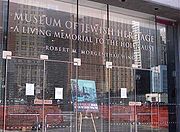
JewishGen
Encyclopedia

Non-profit organization
Nonprofit organization is neither a legal nor technical definition but generally refers to an organization that uses surplus revenues to achieve its goals, rather than distributing them as profit or dividends...
founded in 1987 as a resource for Jewish genealogy. In 2003, JewishGen became an affiliate of the Museum of Jewish Heritage
Museum of Jewish Heritage
The Museum of Jewish Heritage, located in lower Manhattan, is a living memorial to those who perished in the Holocaust. The Museum honors those who died by celebrating their lives – cherishing the traditions that they embraced, examining their achievements and faith, and affirming the vibrant...
– A Living Memorial to the Holocaust in New York.It provides amateur and professional genealogists with the tools to research their Jewish family history and heritage.
History
JewishGen was founded in 1987 by Susan E. King in Houston, TexasHouston, Texas
Houston is the fourth-largest city in the United States, and the largest city in the state of Texas. According to the 2010 U.S. Census, the city had a population of 2.1 million people within an area of . Houston is the seat of Harris County and the economic center of , which is the ...
, USA, as a Fidonet
FidoNet
FidoNet is a worldwide computer network that is used for communication between bulletin board systems. It was most popular in the early to mid 1990s, prior to the introduction of easy and affordable access to the Internet...
bulletin
Bulletin
Bulletin can refer to:Periodicals * The Bulletin, a now defunct Australian magazine* The Bulletin , an alternative weekly published in Montgomery County, Texas, United States...
board with only 150 users who were interested in Jewish genealogy. It later moved to the internet. On January 1, 2003 it became a division of the Museum of Jewish Heritage
Museum of Jewish Heritage
The Museum of Jewish Heritage, located in lower Manhattan, is a living memorial to those who perished in the Holocaust. The Museum honors those who died by celebrating their lives – cherishing the traditions that they embraced, examining their achievements and faith, and affirming the vibrant...
. Primarily driven by volunteers, there are over 1,200 active volunteers throughout the world who actively contribute to JewishGen’s ever growing collection of databases, resources and search tools. In 2008, JewishGen relocated its official headquarters into the museum.
JewishGen’s website is designed to provide a simple and easy interface, and is offered as a free public service. More than 1,000 active volunteers throughout the world contribute to its ever growing collection of databases, resources, and search tools. With more than 400,000 users worldwide, JewishGen has become the central online destination for Jewish
Genealogical research, with more than 20 million Jewish records, hundreds of translated Yizkor (memorial) books, research tools, family finders, educational classes, historical components, and other resources
Mission statement
The mission of JewishGen is to encourage the preservation of Jewish heritage, allowing those with Jewish ancestry to research their roots, connect with relatives, and learn about their family history.This mission will be accomplished by:
- Obtaining records, information, and tools that will be valuable for Jewish ancestral research;
- Maintaining an online community for family researchers to connect with relatives and like minded individuals; and
- Ensuring the JewishGen website continues to offer its resources in an easily searchable and understandable format.
Databases
- JewishGen Family Finder (JGFF) is a compilation of surnames and towns currently being researched by over 90,000 Jewish genealogists worldwide. It contains over 475,000 entries: 100,000 ancestral surnames and 18,000 town names, and is indexed and cross-referenced by both surname and town name.
- Family Tree of the Jewish People (FTJP) is a database of Jewish family trees. The central purpose of the FTJP is to enhance Jews' ability to connect and re-connect their families and to increase interest in Jewish genealogy.
- ShtetlSeeker is a database containing the names of all localities in 45 countries in Central and Eastern Europe, and the Middle East. The data is based on the U.S. Board on Geographic Names databases.
- Communities Database contains information on over 6,000 Jewish communities in Eastern and Central Europe, together with Jewish population figures, historical town names and jurisdictions, inset maps, and links to JewishGen resources.
- Worldwide Burial Registry (JOWBR) is a database of names and other identifying information from cemeteries and burial records worldwide, from the earliest records to the present.
- Holocaust Database is a collection of databases containing information about Holocaust victims and survivors. It currently contains over two million entries.
Country Databases
- Country Databases contain historical records, including birth, marriage and death records, census records, military records, etc. These databases are continual works-in-progress, and new data is added regularly. Databases currently exist for Austria-Czech, Belarus, Britain, Germany, Hungary, Latvia, Lithuania, Poland, Romania and Moldova, Scandinavia, Ukraine and the United States.
Resources/Research Tools
- The Yizkor Book Project aims to translate Yizkor (memorial) books, predominantly written after the Holocaust, into English. There are currently hundreds of completed or partially completed translated books online.
- The Kahal/ShtetLinks Project aims to create “virtual” Yizkor Books online, by creating specific pages for towns and uploading information such as pictures, maps, personal recollections, and research data.
- The Family Pages Project allows family researchers to create their own webpage for free in order to help connect with relatives and learn about their history.
- The ViewMate Project allow users to post photographs and documents online, and request help in translating or identifying information.
- Discussion Groups provide researchers with the opportunity to connect, ask questions, exchange information and learn from others. Discussion groups are categorized by general and specific areas/topics of interest.
Education
- Beginner Pages explain the basics of JewishGen and to navigate JewishGen.
- The JewishGen Education Center offers online interactive courses in Jewish genealogy to help researchers learn methodology, research techniques and organization of information for proper analysis.

